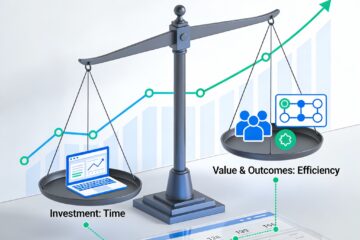In the rapidly evolving landscape of business and organizations, change is constant. Effective change management is crucial for staying competitive and achieving long-term success. However, traditional change management approaches may no longer suffice in a world where data is abundant and complex. Enter AI-powered analytics, a game-changer in the realm of change management. In this blog post, we will explore how AI can revolutionize change initiatives by providing valuable insights for informed decision-making.
The Data-Driven Imperative
In an era where data is often hailed as the new oil, harnessing its power becomes paramount. Organizations accumulate vast amounts of data daily, encompassing everything from customer interactions to internal operations. This data, when properly analyzed, holds the key to understanding organizational dynamics and facilitating change. But with the sheer volume and complexity of data, traditional methods fall short.
The Role of AI in Change Management
Artificial Intelligence (AI), with its machine learning algorithms and data processing capabilities, has emerged as a catalyst for effective change management. It can sift through mountains of data to uncover patterns, trends, and valuable insights that would be challenging to discern through manual analysis.
AI-Powered Analytics for Change Management
Here’s how AI-powered analytics can supercharge change initiatives:
- Predictive Insights: AI can analyze historical data to predict potential bottlenecks or resistance points in change management. By identifying these challenges early, organizations can proactively address them.
- Personalized Change Strategies: AI can segment employees or stakeholders based on their preferences and readiness for change. This allows organizations to tailor change communication and strategies for maximum impact.
- Data-Backed Decision-Making: AI provides decision-makers with data-driven insights into the effectiveness of change initiatives. This informs course corrections and ensures that change efforts remain aligned with organizational goals.
- Real-time Monitoring: AI-powered dashboards can provide real-time updates on the progress of change initiatives. This transparency allows leaders to make informed decisions and quickly address issues as they arise.
- Enhanced Employee Engagement: AI can analyze employee feedback and sentiment, helping organizations gauge employee morale and engagement during change processes. This information can guide adjustments in the change strategy to improve employee buy-in.
Case Study: AI-Powered Change at Company X
Consider the case of Company X, a global tech firm looking to implement a new project management software across its various teams. The change management team at Company X leveraged AI-powered analytics to:
- Predict which teams were likely to face challenges in adopting the new software.
- Identify key influencers within the organization who could champion the change.
- Personalize training modules based on employees’ existing skills and learning preferences.
- Monitor real-time user feedback to make rapid improvements to the software and training.
As a result, Company X experienced a smoother transition to the new software, minimized disruptions, and achieved faster adoption rates, all thanks to AI-driven insights.
Conclusion
In the era of data-driven decision-making, AI-powered analytics are revolutionizing change management. They provide organizations with the tools to anticipate challenges, personalize strategies, monitor progress, and enhance decision-making throughout change initiatives. Embracing AI in change management isn’t just about staying competitive; it’s about driving successful, data-backed transformations that lead to long-term organizational success. By leveraging AI for insights, organizations can navigate change with precision and confidence.


